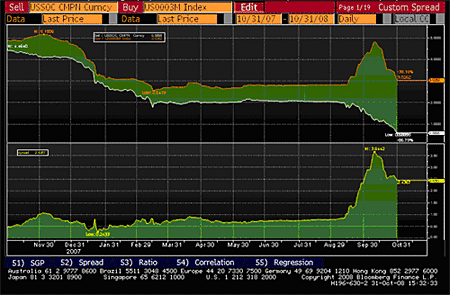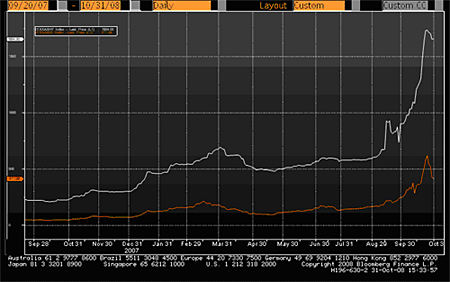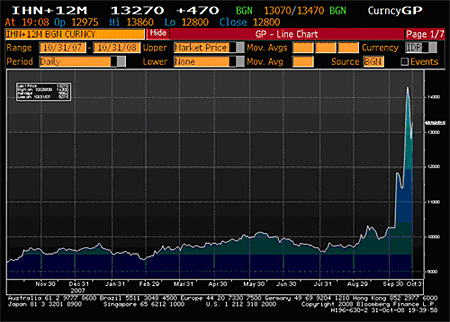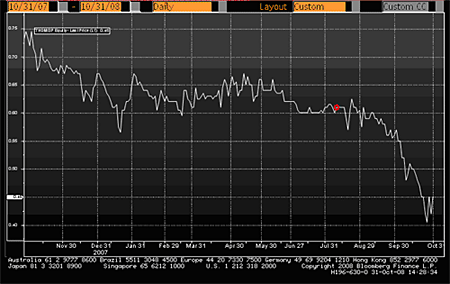It's not time to buy into the Asian rally just yet
There are hints that the credit freeze is thawing just a little. And if that keeps up, stocks can probably use it as a springboard for some pretty big gains. But, says Cris Sholto Heaton, it's not time to buy into Asian markets just yet. Here, he explains why…

Get the latest financial news, insights and expert analysis from our award-winning MoneyWeek team, to help you understand what really matters when it comes to your finances.
You are now subscribed
Your newsletter sign-up was successful
Want to add more newsletters?

Twice daily
MoneyWeek
Get the latest financial news, insights and expert analysis from our award-winning MoneyWeek team, to help you understand what really matters when it comes to your finances.

Four times a week
Look After My Bills
Sign up to our free money-saving newsletter, filled with the latest news and expert advice to help you find the best tips and deals for managing your bills. Start saving today!
Calling the bottom of a stock market rout is a dangerous game, and one which it's very easy to get wrong. But recent developments suggest we may have seen the bottom of the plunge for now.
Things are still pretty bad out there, especially in the credit markets. But there are hints that the credit freeze is thawing just a little. If that keeps up, and we get just a little more good news, stocks can probably use it as a springboard for some pretty big gains.
However, I don't think it's time to buy in just yet here's why
MoneyWeek
Subscribe to MoneyWeek today and get your first six magazine issues absolutely FREE

Sign up to Money Morning
Don't miss the latest investment and personal finances news, market analysis, plus money-saving tips with our free twice-daily newsletter
Don't miss the latest investment and personal finances news, market analysis, plus money-saving tips with our free twice-daily newsletter
Fear is starting to fade
First, there are signs that the interbank markets are slowly returning to - well, not normal, but a lesser degree of crazy. The three-month Libor-OIS spread the difference between the rate at which banks can borrow in the interbank market for three months and the expected change in central bank base rates over the same period is starting to tick down, as you can see in the bottom panel of the chart below.

Fear seems to be dropping a little in the broader debt markets as well. The iTraxx Asia credit default swap index - which measures the cost of insuring against companies defaulting on their debt - has begun sliding for investment grade firms (the red line) and even edging off a little for riskier debt (the white line).

Meanwhile, the currency markets also seem to be relaxing a little. The Korean won, Asia's worst performing currency this year, has rebounded sharply against the dollar over the week. Traders have also begun to cut back bets on an enormous devaluation in the Indonesian rupiah. Derivatives contracts betting on what the rupiah/dollar exchange rate will be in a year's time have retreated significantly after pricing in a plunge of around 50% at the peak of the panic.

The huge amounts of money that the Federal Reserve and European Central Bank have pumped into markets is clearly helping to bring down the levels of terror, albeit much more slowly than bankers would like. It's also slowed the deleveraging process that's caused overextended investors including hedge funds - to dump huge volumes of liquid assets as their credit lines get pulled.
Importantly for confidence, the authorities have also shown that they've learned lessons from the Asian crisis of 1997-1998 and will act much more quickly to stop an emerging market panic this time. The IMF has set up a new short-term lending facility to lend cash to otherwise sound emerging market countries suffering liquidity squeezes, as well as providing more than $40bn for Hungary and Ukraine as the two countries teetered on the edge of crisis. Bailouts for some other Eastern Europe countries, for Pakistan and for any others in severe stress, are likely to follow.
Meanwhile, the Fed has expanded its swap arrangements with other central banks to include $30bn lines for Brazil, Mexico, Singapore and South Korea. These swaps mean that, if needed, the Fed will provide these banks with US currency so that they can alleviate any dollar shortage in their local interbank markets without running down their foreign exchange reserves. That's a big help for South Korea, for example, since Korean banks have substantial dollar borrowing needs.
Developed markets are leading the rebound
And as the fear starts to evaporate, investors are beginning to look at valuation again. And they're seeing that Asian equities are looking pretty tempting: the MSCI Asia-ex Japan briefly touched 231 on Monday, putting it on a price/book ratio of just 1.08.
The AxJ hasn't rebounded that strongly yet, because it's a regional index and the big gains have been in the developed markets as you'd expect in the first stage of a bounce. Hong Kong is up 25% off its lows, South Korea 20%, Japan 15% and Singapore 10%. If this rally continues and confidence builds, we can expect to see a lot of money flooding back into the emerging markets and big rebounds there as well.
So why am I not completely optimistic yet? Well, I suspect this is still a bear market rally. It may run for quite a while possibly into next year. But there's still a lot of bad news to come, and when it really begins to roll in, markets will probably sell off again. Whether they'll reach their recent lows again it's impossible to say, but they will almost certainly fall back a long way.
One reason to be gloomy is the risk or more accurately, the certainty of more earnings downgrades. We've mentioned before that analysts' earnings forecasts remain far too optimistic as we head into a global slowdown and likely recessions in many Asia countries. Estimates are slowly coming down. The consensus for the AxJ next year now stands at 29, down from 39 at the peak this year, according to Bloomberg. But history strongly suggests that a 25% fall is much too mild up to 50% is far more likely.
Similarly, there's a lot more disappointment to come on global growth. This week, the first estimate for US third quarter GDP came in at -0.3%, which was actually better than most economists expected. That helped to buoy markets, but you have to remember that these initial estimates usually get revised significantly, so it will probably be taken down (or even up) substantially next month.
More importantly, there's still a widespread illusion that the US will have a brief V-shaped recession with a sharp rebound after a couple of quarters. That's unlikely, no matter how much cheap money, tax cuts and public spending authorities try to throw at them. There a real chance of a long recession, perhaps until the end of 2009 or longer, followed by a slow recovery.
Once it's clear we're not going to have a quick recovery in the first half of next year, there will be another reason for markets to sell off again. That should mark the last phase of the bear market in Asia and give us the opportunity to turn fully bullish again.
Slow and steady at Thomson Medical Centre
With the reporting season now under way in Singapore, it's time for a quick update on Thomson Medical Centre (SIN:5FV). You may remember that I picked this women and children's hospital for its attractive combination of stability it runs Singapore's largest maternity hospital with good growth prospects through its expansion plans in Vietnam.
Since then, the stock has slid like almost everything in the markets, down around 25%. But as a low-profile stock in a defensive sector, it has outperformed the Straits Times benchmark, down 35% over the same period.

Full-year results were pretty much as I expected, with profits up 18% year-on-year. Profits in the final quarter were flat year-on-year, but this was mostly due to the closure of a ward for renovation, rather than a slowdown in demand for its services. The firm continues to gain market share: the number of births in its hospital rose 11.7%, faster than the overall rise in births in Singapore.
| Row 0 - Cell 0 | FY07 | FY08 | FY09E |
| Revenue (S$m) | 52.4 | 60.3 | 68 |
| Row 2 - Cell 0 | Row 2 - Cell 1 | 15.1% | 12.8% |
| Net profit (S$m) | 9.5 | 11.2 | 12.9 |
| Row 4 - Cell 0 | Row 4 - Cell 1 | 17.9% | 15.2% |
| EPS (Sc) | 3.26 | 3.84 | 4.4 |
| Row 6 - Cell 0 | Row 6 - Cell 1 | 17.8% | 14.6% |
Analysts are forecasting growth of around 15% next year, though I wouldn't be surprised if it comes in a bit slower than that: with Singapore heading into recession, it's likely that some people will chose to put off having a child. But the firm should still make healthy profits and the long-term story in Vietnam remains on track.
Thomson is overseeing the development and management of a hospital in Binh Duong, where construction should be completed in the third quarter of 2009, in which it has the option to take a 25% equity stake. In September, it signed a deal with the same consortium to work on a proposed hospital in Hanoi. If the project goes ahead, Thomson plans to acquire a similar stake.
Financially, Thomson continues to look sound. Debt levels are still falling, with an interest-bearing debt/equity ratio of just 3.8%. The final dividend of 1.5S/share, taking the full year payout to 2.5S/share a 12-month yield of 4% on the price at the time I picked it. In all, Thomson isn't doing anything terribly exciting, just getting on with business and that suits me fine.
Turning to the markets
| Market | Close | 5-day change |
| China (CSI 300) | 1664 | -6.6% |
| Hong Kong (Hang Seng) | 13969 | +10.7% |
| India (Sensex) | 9788 | -3.8% |
| Indonesia (JCI) | 1257 | +1.0% |
| Japan (Topix) | 867 | +7.6% |
| Malaysia (KLCI) | 864 | -3.1% |
| Philippines(PSEi) | 1951 | -0.1% |
| Singapore (Straits Times) | 1794 | +2.8% |
| South Korea (KOSPI) | 1113 | +18.6% |
| Taiwan (Taiex) | 4871 | +6.4% |
| Thailand (SET) | 417 | -3.8% |
| Vietnam (VN Index) | 347 | +0.6% |
| MSCI Asia | 80 | +9.3% |
| MSCI Asia ex-Japan | 277 | +12.7% |
After a sell-off on Monday, Asian markets rebounded strongly, led by Hong Kong. The Hang Seng index briefly touched its lowest level since mid-2004 and traded on a price/book ratio of 1.05, before surging more than 25% in four days. China was the only market that failed to regain any ground during the week, after a number of disappointing earnings announcements.
In Indonesia, the biggest faller was mobile phone operator Bakrie Telecom, which closed down 34% on the week and is off 73% since the start of October. The firm is part-owned by Bakrie & Brothers, which needs to raise $1.2bn to repay debt after shares pledged against collateral against borrowings plunged in value during the global market rout. As well as Bakrie Telecom, shares in coal giant Bumi Resources and oil producer Energi Mega Persada may also be on the block. The Bakrie group, Indonesia's biggest listed investment company, is controlled by the family of welfare minister Aburizal Bakrie.
Meanwhile, in the currency markets contracts on the value of the Chinese renminbi in twelve months time are now trading at 7 RMB/USD, below the currency's current value of 6.85 RMB/USD. Until this summer, the rise of the renminbi was seen as a one-way bet, but traders now expect the Chinese authorities to hold back or reverse the process in order to protect their exporters' competitiveness as global demand slows.
Get the latest financial news, insights and expert analysis from our award-winning MoneyWeek team, to help you understand what really matters when it comes to your finances.

Cris Sholt Heaton is the contributing editor for MoneyWeek.
He is an investment analyst and writer who has been contributing to MoneyWeek since 2006 and was managing editor of the magazine between 2016 and 2018. He is experienced in covering international investing, believing many investors still focus too much on their home markets and that it pays to take advantage of all the opportunities the world offers.
He often writes about Asian equities, international income and global asset allocation.
-
 The downfall of Peter Mandelson
The downfall of Peter MandelsonPeter Mandelson is used to penning resignation statements, but his latest might well be his last. He might even face time in prison.
-
 Default pension funds: what’s in your workplace pension?
Default pension funds: what’s in your workplace pension?Default pension funds will often not be the best option for young savers or experienced investors